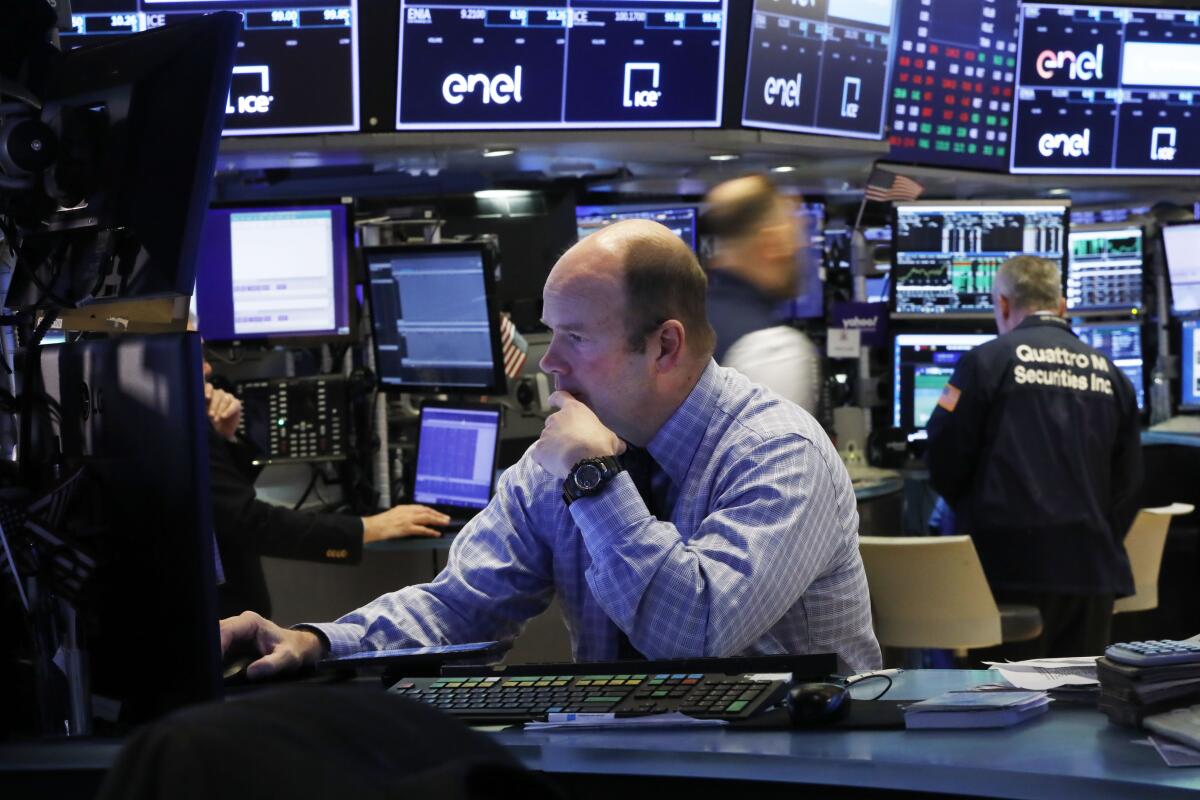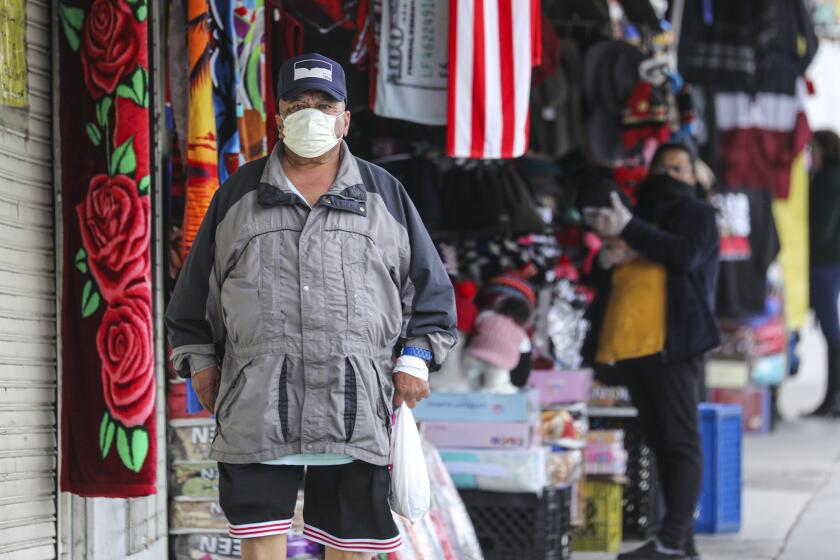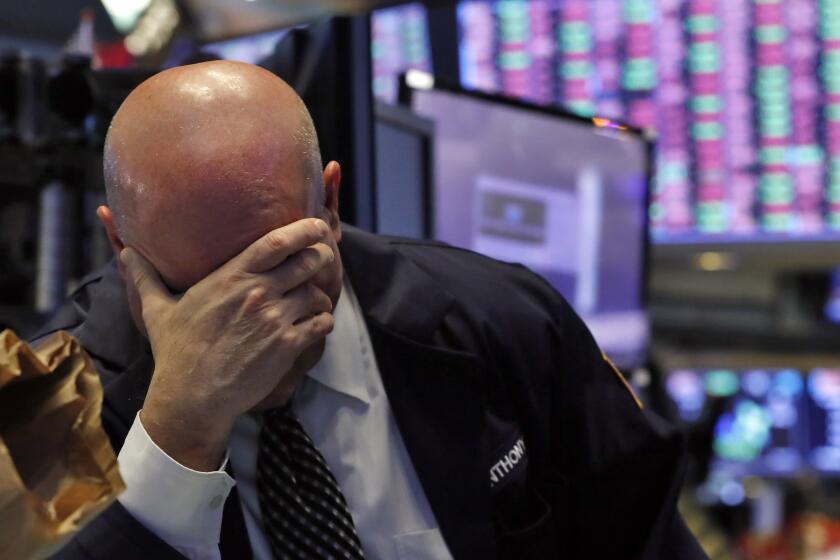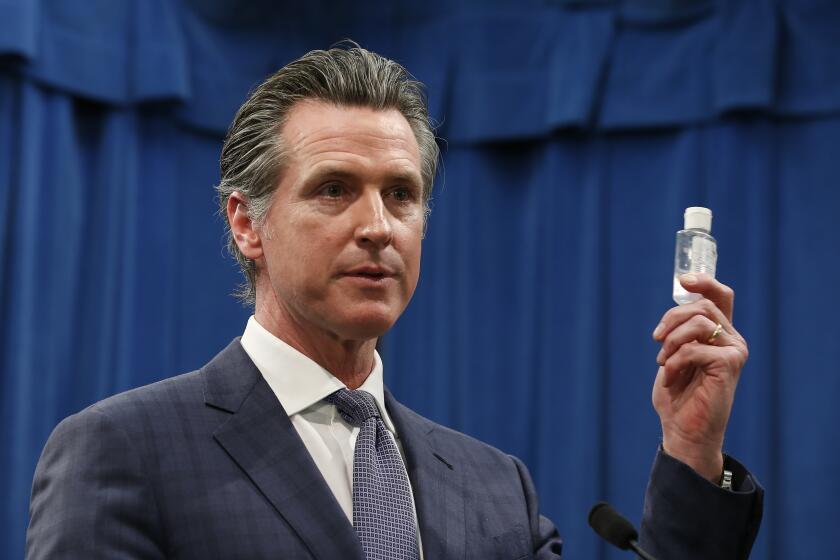Coronavirus is slamming markets. What’s an investor to do?

With the markets on Thursday taking their biggest fall since 1987’s Black Monday and the record-setting bull run now a thing of the past, the average investor with a nest egg tied up in a 401(k) might feel powerless to stanch the blood-letting. In many cases, sitting tight amid the mayhem and stock market gyrations is the best approach, though some believe there could be steps an investor can take to limit the damage.
The Times spoke to several noted investment advisors and market observers for their views on the markets:
Komal Sri-Kumar
President, Sri-Kumar Global Strategies, Santa Monica
Sri-Kumar is a prominent macroeconomist who advises multinational firms and sovereign wealth funds on global risk and opportunities.
Put Sri-Kumar in the camp of “you are going to have to wait this one out,” though the decline in prices also presents an opportunity for younger investors.
Even before the rapid coronavirus outbreak, he had been predicting a recession for the middle of this year, which would have tamped down the stock market.
Get the latest coronavirus updates from our staff in California and around the world.
“This market had been a long time coming, and I have been saying publicly for some time that investors should go on the defensive, which means you should cut back on your equities exposure. Now as a result of the recent developments, my expectation of a recession are even more strengthened than before,” he said.
He believes the GOP tax cuts passed in 2017 created a “sugar high” that pumped up economic growth for the first two quarters, but was not sustainable since it was not tied to fundamentals, such as job training and education that could boost the economy for the long term.
Instead, the tax cuts prompted “enormous” stock buybacks by American corporations, while very low interest rates helped boost corporate earnings by reducing borrowing costs. That led to a mentality among investors “that in the Trump administration, stock prices have only one way to go and that is significantly up.”
The result, Sri-Kumar said, was that stock market valuations were extremely high and the market was “priced to perfection” — so long as there’s no bad news in the world.
“I’ve been asked if the coronavirus was a black swan, an unexpected development,” he said. “North Korea may have lobbed a missile. Last time it went past Japan and fell into the water. Next time it might hit a Japanese location. Then you have a pandemonium in global capital markets. If it hadn’t been [the virus], it would have been something else.”
He thinks an expected cut in interest rates by the Federal Reserve later this month will not do much to quell the market turbulence, and a general payroll tax cut the Trump administration is pushing for won’t be of much assistance either. Instead, he said, President Trump and Congress must come together for a “very targeted fiscal approach” that would spend money on medical research and prevent smaller and midsize firms that employ the majority of people in the country from failing.
Concern about coronavirus, and the Trump administration’s reaction to it, sent markets sliding to their worst day in more than three decades.
So what is the average investor to do? If that person is in their 20s, he said it would OK to “get their toes wet” by buying into the market now and on a consistent basis as it keeps going down, an approach called dollar-cost averaging.
“If you are in your late 50s or older, then I would say just sit tight if you have a good manager and wait for the correction to be over. Don’t get out and into cash because then not only don’t you have equities, but when the recovery takes place, you have nothing to go up with,” he said.
David Bailin
Chief investment officer, Citi Private Bank, New York
The bank, a unit of Citigroup, offers money management and other services to clients with assets of at least $25 million.
While it would be a stretch to label Bailin an optimist amid the biggest market rout in more than 30 years, the chief investment officer of one of the most exclusive private banks in the world sees tremendous buying opportunities amid the rubble — and not just for the ultra rich.
“I would give the same advice to my father as I am going to give a wealthy client in this environment,” he said. “Do not sell equities when markets have had this big a move. I have to say that wealthier people are actually investing now, because they have the benefit of being able to think five to 10 years out, and they know these are times you can get very, very good values.”
Of course, that advice is based on assumptions and caveats, a critical one being that investors believe that the U.S. and foreign governments will ultimately get right their response to the coronavirus outbreak and the widening economic fallout.
Gov. Gavin Newsom issues an executive order that allows California to commandeer hotels and hospitals to treat patients with the coronavirus.
Unlike some advisors who believe that the market had been highly overvalued, Bailin said the bank believed that underlying economic conditions supported the recent record run that topped out Feb. 12, including the end of the trade war, high personal savings, low unemployment and a 7% forecast in corporate earnings growth.
Many of those conditions are now being tested by the coronavirus, but the bank is viewing the outbreak as a severe but still “exogenous” economic shock, not one that necessarily alters those fundamentals — even if the economy enters a technical recession, defined as two consecutive periods of negative economic growth.
“When this economic period is over, let’s say six months from today, buying intentions, individuals and corporations, are going to remain in our opinion largely intact. If you intended to buy a car and you don’t buy it today, you are going to do it in six months,” he said.
So what does it mean to get right the response to the virus? Bailin believes a “shock and awe” approach similar to the 2008 bank bailout is in order. He is in favor of President Trump’s payroll tax cut, boosting and extending unemployment benefits, and loans to struggling businesses — along with a very large monetary stimulus to ensure liquidity.
The bank in particular likes quality companies where earnings and dividend growth is expected, particularly in healthcare, fintech, cybersecurity and alternative, non-fossil fuel energy.
But what about the 60-year-old worker facing retirement and watching his 401(k) taking haircuts by the hour? Bailin says whatever that investor does, selling equities should not be an option. In fact, he recommends the opposite.
“For somebody who has a 50-50 portfolio, you want them to rotate slowly from their fixed income portfolio and add equities over time. You can’t market time. You can’t choose when to enter the market, but you can choose to enter the market,” he said, recommending a steady, dollar-cost averaging approach.
Kevin Barlow
Managing director, Miracle Mile Advisors, West Los Angeles
The registered investment advisory firm provides wealth management services to high net worth individuals and families, typically with an average net worth of $3 million to $5 million.
Money managers at the firm have been telling clients to stick with their current investment plan even as the stock market drops and rebounds, creating a whipsaw effect that’s enough to nauseate even the sturdiest investors. One reason for that? The firm had met with clients earlier this year and stressed that they should not expect the 30%-plus market returns of 2019.
“Any financial plan or strategy that was created and didn’t account for a potential 20% drop in the markets was not one that was going to succeed over the long term,” Barlow said. “Our view is the right positioning decisions are the ones that are made prior to when all the market turbulence hits, not in the middle of all the turbulence.”
He said the firm “took risk off the table” by adding cash to client portfolios and taking a defensive position in the middle of 2019, but with bond yields low, it did not direct a lot of money into that asset class. It also reduced clients’ holdings in companies that have exposure to global trade, which tend to have a higher risk. That was mostly driven by tariff fears, but has stood up well amid the coronavirus outbreak.
It also moved clients’ stock away from industries that had seen run-ups, such as semiconductors and technology, and into such areas as consumer staples for accounts that were equity based. Companies that it saw as better investment opportunities were in healthcare and consumer staples, such as Colgate-Palmolive. Barlow noted that Walmart and Costco,where people buy essentials, were doing relatively well, though even those companies fell amid Thursday’s market rout.
One of the firm’s prime concerns now is whether the coronavirus and the drastic responses by governments and companies will cause not only a temporary disruption in the economy, but affect fundamentals, especially if layoffs start and hiring stops.
“That’s going to affect markets more like nine to 12 to 18 months out and may have impacts throughout the rest of this year and into next year. And I think that is where a lot of the fear lies right now,” he said.
Even so, Barlow cautions the average investor from taking any precipitous moves, noting younger investors should easily weather the storm, while older ones could make a hasty decision they could regret.
“This is an event-driven bear market and an event-driven bear market tends to recover all their losses within 15 months,” he said. “If there is one sort of piece of advice, it’s that when we are in turbulent times like this, don’t flip the boat. One bad decision in a time like this can hurt you quite a bit.”
Alex Chalekian
Founder and chief executive, Lake Avenue Financial, Pasadena
The firm is a registered investment advisor to clients with an average account size of about $400,000.
While Chalekian said he never recommends anyone should try to time the market, something he calls impossible, he does believe that it still may be possible for investors to stem some of their downside risk because there are “going to be huge ripple effects” from the virus yet to be experienced.
“We are in uncharted territory here,” he said. “People have forgotten there are risks. All they have seen for the last 10 years is their account values go up.”
In late February, the firm wrote a post on its blog raising the possibility that the coronavirus could have a far more reaching impact on the world economy than outbreaks of past viruses. Since then, he had become increasingly concerned.
The advisor has moved funds in non-retirement accounts into less risky assets, such as municipal bonds. In retirement accounts, many assets were moved into treasuries. Also, the firm shifted assets into a Blackrock-managed exchange traded fund, the iShares USMV, that is structured to minimize downside risk, though investors have to give up some upside potential.
“Late last year, we wanted to take some risk off the table. We did the same thing in 2006 and 2007. When things don’t make sense or it doesn’t feel good, we want to start making some moves,” he said. “I don’t have a crystal ball, but my guess is that the damage isn’t done and there is still more downside.”
With the Federal Reserve widely expected to cut rates again at its meeting this month, he expects bond prices to continue to go up, providing an opportunity for investors to lessen their downside risk.
“Inside a 401(k) plan, if they want to lower the risk in their portfolios, they should look at the cash options as well as the fixed income options, bonds and so forth,” he said, adding investors should always first consult their financial advisors.
“We are going to have what I call a yo-yo market for a while, but it will continue to go lower if I had to predict, before it turns around,” he said.
More to Read
Inside the business of entertainment
The Wide Shot brings you news, analysis and insights on everything from streaming wars to production — and what it all means for the future.
You may occasionally receive promotional content from the Los Angeles Times.














